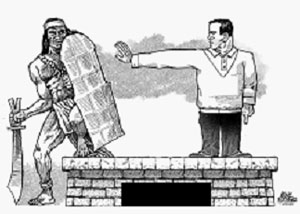Ambivalent Victory

When Spain set sail for the other side of the world to expand its empire, the aim of was both economic dominance and a religious mission.
Conquistadors like the Portuguese commissioned by the Spanish throne, Ferdinand Magellan, were accompanied by priests like Friar Pedro Valderrama, the Andalusian chaplain of Magellan’s fleet.
On the other side of this colonial conquest were natives like Datu Lapu-Lapu of Mactan.
Lapu-Lapu was different from at least two other chiefatins Magellan’s expedition encountered.
Almost a month before his death, Magellan’s expedition was befriended by the king of Mazaua, widely believed to be Butuan, in Agusan del Norte province. The first Catholic Mass on Philippine soil was celebrated there on March 31, 1521.
Article continues after this advertisementTwo weeks later, Magellan’s expedition was shown the same hospitality by Rajah Humabon of Cebu.
Article continues after this advertisementBut the explorer was to later face a different chieftain across the Mactan Channel. Lapu-Lapu resented the arrival of the Caucasian visitors. Based on historical accounts, the animosity towards the Spanish was fueled by the rivalry of Lapu-Lapu and Humabon.
As Cebuanos stand proud of their home as the cradle of Christianity in the country, best shown in veneration to the Child Jesus, the Sto. Niño, Oponganons in Mactan island take pride in their origins as children of Datu Lapu-Lapu as much as they do their devotion to the Virgin of the Rule or Birhen sa Regla.
In his book History of the Filipino people, Teodoro Agoncillo characterized the resistance of local chieftains like Lapu-Lapu as motivated by personal reasons, religious and economic causes.
Although, freedom from Spanish colonialism was won more than a hundred years ago, we are still struggling to define ourselves as a nation and a people.
Unity remains an aspiration.
All the more now, the election season brings out the counter productive side of partisan politics, personality-based leadership and intolerance.
It would be good to recall the courage of Lapu-Lapu who stood his ground to protect his tribe, even if it appeared that the odds were against him.
Unity of purpose brought him victory.
The arnis-wielding chieftain remains Cebu’s most enduring legend.